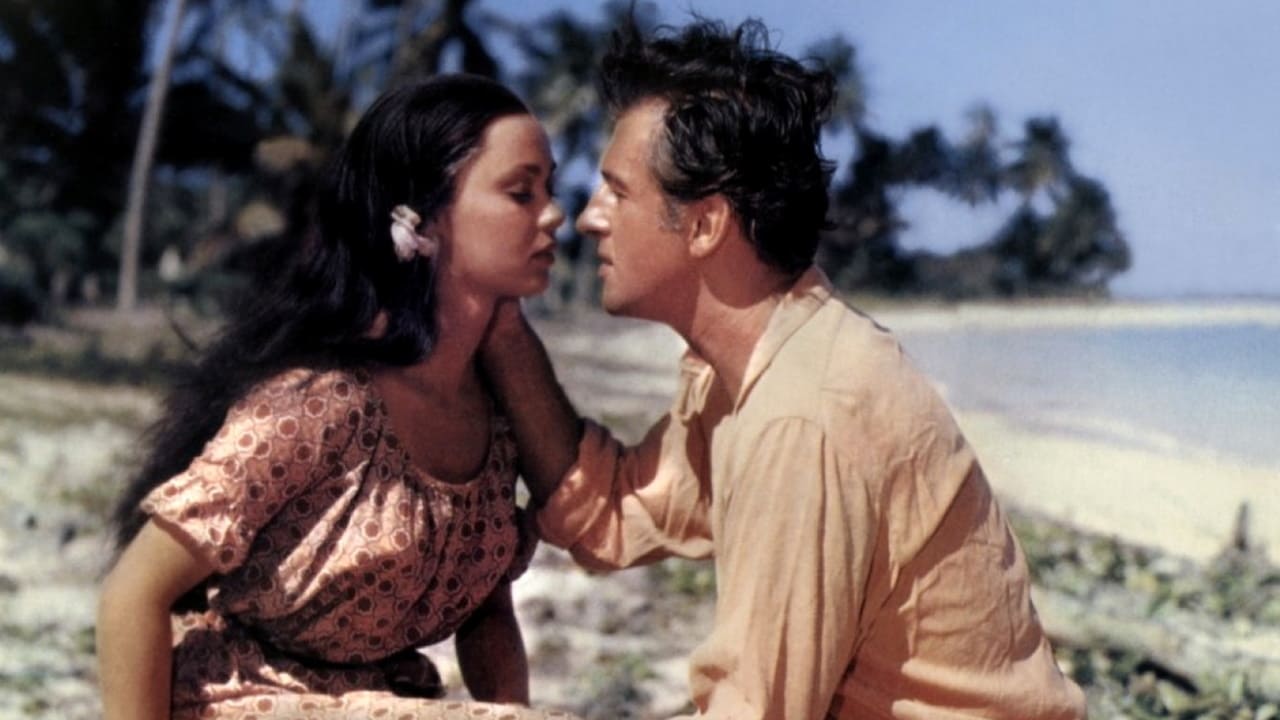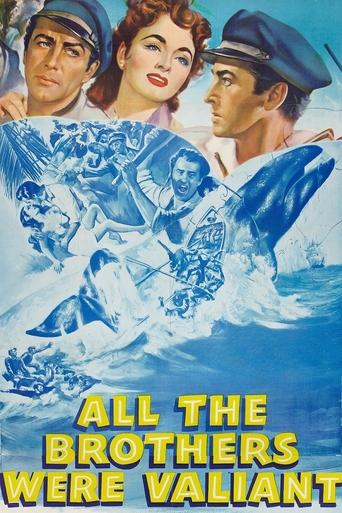

Moby Dick with sex appeal. Another adaptation of The Pardoner's Tale (men turned against each other by greed) to a different historical context, a la The Treasure of the Sierra Madre. Here the setting is a South Seas island and a whaling vessel in the 1850s, with a bag of pearls (especially an enormous black one) standing in for gold. Stewart Granger and Robert Taylor play off of each other well in a Cain and Abel dynamic. Ann Blythe makes good eye candy in a wardrobe of interesting period textiles, as the unfortunately named "Pris." Interesting to see a nineteenth-century set movie involving a woman at sea. Betta St. John is smoldering as her dark counterpart "The Native Girl," in politically incorrect grease paint. Other things to recommend it are Oscar-nominated cinematography, Lewis Stone's last film appearance, a rousing action score, and a harrowing whale chase with a rubber model complete with flippable fluke. Lots of great ship shots as well, and really remarkable art direction. A presumably authentic sequence of a whale being butchered and boiled for oil is a highlight, and has more grit and realism than one expects from these florid, high-seas romances. It seems the beach shots were filmed on location in Jamaica, a bit of a let-down because I was hoping I might catch some familiar Hawaii scenery, but they are beautiful and passable as Pacific locales nonetheless. The film looses momentum a bit toward the end, but on the whole it's more interesting and better done than many of the genre.
... View MoreThere are far too many villains in "All the Brothers Were Valiant", an update of an old silent where two brothers continue the family destiny at sea. The two brothers are as different as night and day. We meet them over a series of flashbacks of their ancestors writing in the ship's log that has been passed down from one generation to the next, and as one of the brothers is presumed dead, surviving brother Robert Taylor learns his brother had made many enemies at sea. Taking over the vessel, he marries the dead brother's former sweetheart (the lovely Ann Blyth, cast as more than just another pretty face here) and heads out for an adventure of whaling. But like the legend of Enoch Arden, the dead brother (Stewart Granger) returns, and their old rivalry is revealed, Granger gloating over having always taken away Taylor's toys as a child, and vowing to do that now both with the ship and with Blyth.First, though, there is an adventure concerning pearl diving where Granger explains his whereabouts while presumed dead as he joined up with pearl hunters James Whitmore and Kurt Kasznar who are as villainous as the men aboard Taylor's crew. The extended sequence is like something out of one of Dorothy Lamour's Paramount adventures featuring tropical settings (near the Cape of Good Hope) and the two men being done in by their own greed. But Granger learns nothing from this adventure, and utilizes the men on Taylor's boat to plot mutiny so they can return to find the bag of pearls accidentally dropped into the bottom of the sea.Rather violent in some sequences, this attractive color production screams "silent movie!" with its melodramatic dialog and the contrast of good and evil between the two brothers. It is odd to see Granger playing such an amoral character, but there are elements of good in him that creep out on occasion to make him less one dimensional than the characters played by such character actors as Keenan Wynn, Robert Burton and James Lupton. "Judge Hardy" Lewis Stone has a cameo in this his last film, having died tragically on his front lawn after having a heart attack while dealing with juvenile delinquents breaking up his lawn furniture. Betta St. John is the native girl Granger briefly takes up with in his south sea adventure. Overall, this may not be a classic, but as adventure, it is lots of fun, and a reminder of the power of nobility.
... View MoreThis film has quite a good story by Ben Ames Williams, which was competently brought to the screen. Robert Taylor is the "good" brother and Stewart Granger the "bad" one. Ann Blyth is the woman who marries Taylor thinking Granger is dead. Three years later Granger and Taylor would star in "The Last Hunt" with a reversal of roles: Granger as the "good" guy and Taylor the "bad". There are two aspects of this film which create a strong impression:1)the destructive relationship between the brothers, which started in childhood with Granger always taking for himself Taylor's toys. Now Granger wants to take away Taylor's ship and also his wife. 2)How Granger is able to seduce Ann Blyth by making her think her husband is a coward. Blyth is a bit too "angelical" for her role, when you see the ship you have the feeling you are seeing a miniature on MGM's tank, but both Granger and Taylor are excellent. Great entertainment.
... View MoreThis is one of my favorite stories as a writer, and it has been for fifty years. MGM had many contract players still on its roster in the early 1950s, among them its most used leading men Robert Taylor and Stewart Granger. To pair with them, as a woman loved by both, studio executives decided to use Ann Blyth, their lovely dark-haired all purpose singing and dramatic star and Betta St. John, along with many fine supporting actors such as Lewis Stone, Kurt Kasznar, Keenan Wynn, Michael Pate, John Lupton, Leo Gordon, Frank DeKova, Peter Whitney, and James Whitmore. This is an adventure that might have been played as an explicit-idea-level drama, since it has many dramatic elements. But it is also a complex, dialogue-rich film with exotic locales and actions, the strong music of Miklos Rosza and a story-line second to none. The Nathan Ross is a sturdy whaling ship from a proud New Bedford Massachusetts family's line of such ships. The men who go to sea in such frail vessels hunt the world's largest mammals with harpoons hurled from longboats; they risk dangers from wild islanders, pirates and inimical ships in foreign service; but sometimes the greatest danger comes from their own failings, passions and obsessions. "All the Brothers Were Valiant" was directed by action expert Richard Thorpe from a script by Harry Brown based on a Ben Ames Williams novel. The story-line was first revealed in a movie magazine in the year of release, along with "Shane" and several other soon-to-be-released films, which is when I first read of it. The production itself was filmed in color and I find it to be beautifully mounted. Cinematography was provided by George Folsey with art direction by Randall Duell and Cedric Gibbons and set decorations by Hugh Hunt and Edwin B. Willis. The vivid costumes were the work of Walter Plunkett. Douglas Shearer as usual at MGM was the sound engineer, and this must have been one of his most difficult assignments. The story-line, remake of a silent 1920s film, begins with an exciting flashback. The year is 1857. Mark Shore (Granger) has been reported lost at sea. What really happened is he had contracted a fever and had been drinking. He ended up on an island where a beautiful native girl (St. John) nursed him, and told him of a fabulous fortune in untouched black pearls. They are chased by furious natives, and he somehow escapes. In the meanwhile, his brother, Joel Shore (Taylor) has been appointed captain of the Nathan Ross. He has also married lovely Priscilla (Blyth) who had been fonder of the more dashing Mark all along. He takes her with her on the three-year-long whaling voyage as his bride, as captains frequently did in those days. And after adventures such as a whale hunt and storms, Mark finds his way back aboard ship. he claims the captaincy; Taylor tells him that he is captain of the Nathan Ross and offers to make him mate. Once aboard, Mark then starts angling to excite the men about the possibility of going back for the fortune in pearls, which lie in only 12 feet of water, just waiting to be harvested. What happens hereafter is the fomenting of a mutiny, which at the last Granger refuses to allow to run its course, He and Taylor battle the ship's mutineers and at the last, in keeping with a strange tradition which is practiced at the end of each day when the captain of the ship writes his "log" or journal report, he is able to say of Mark as well as himself, "all the brothers were valiant". This is a complex and interesting tale, I suggest, and one filled with fascinating minor characters and dramatic interplay among the persons and crewmen involved.. Granger is very good as Mark, and Blyth is unusually good for a young actress as the woman they both desire. Taylor is stalwart and capable as the serious-minded brother also. Many of the supporting actors are outstanding, as they must play honest seamen and obsessed mutineers or disappointed loyalists as well. Also aboard or involved were in addition to those already named John Doucette, Robert Burton, James Bell, Stanley Andrews, Tyler McVey, Mitchell Lewis, Henry Rowland and Jonathan Kott among others. I recommend this story as a fine and strongly-plotted adventure; its theme is honor, and its production values both I find to be very high indeed.
... View More